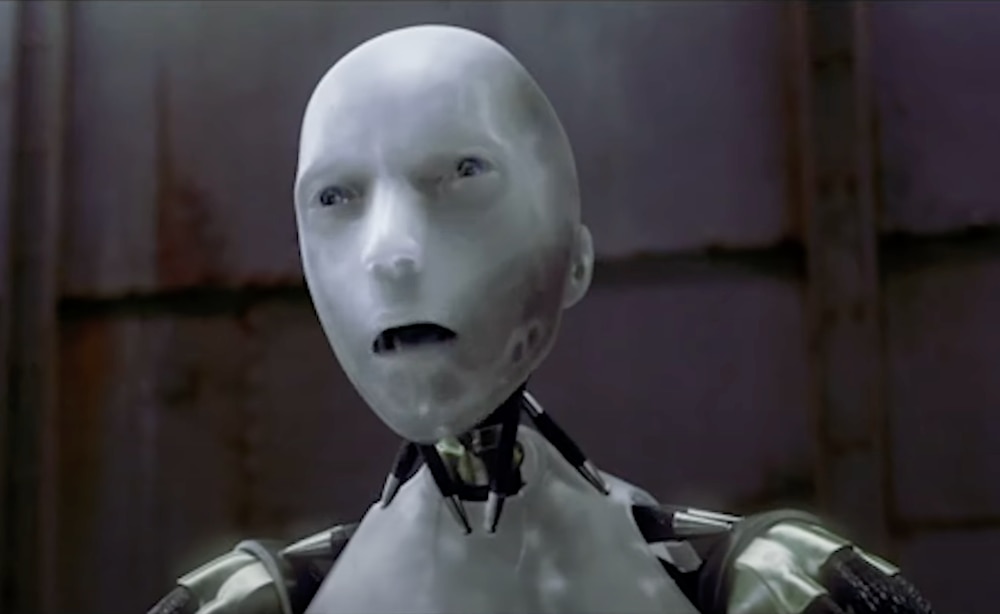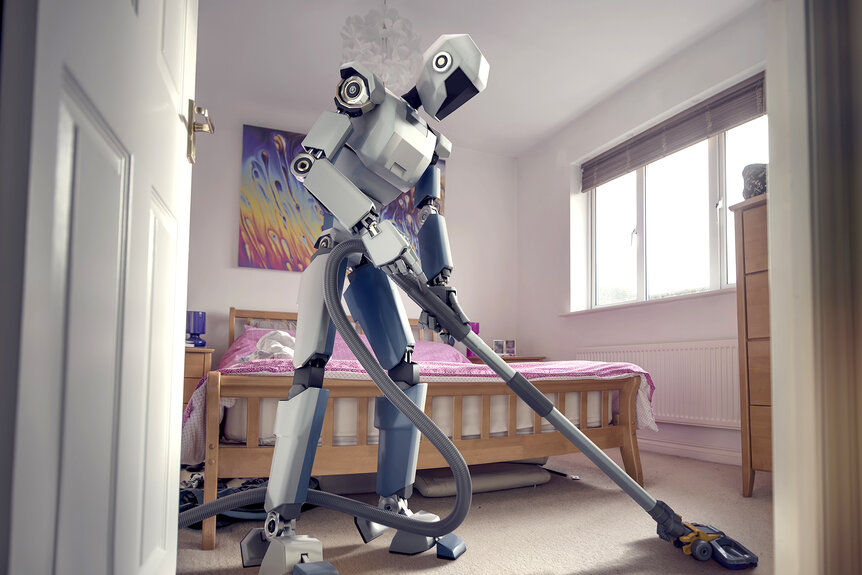Create a free profile to get unlimited access to exclusive videos, sweepstakes, and more!
Experts estimate robots will do 39% of household chores by 2033
Gather ye dust bunnies while ye may.

The 2004 big screen adaptation of Isaac Asimov’s collected robot stories, I, Robot (streaming now on Peacock!) actually shares very little with its namesake. Aside from some window dressing like the three laws of robotics and a character name or two, it’s really its own near-future narrative loosely set in Asimov’s wider universe. The reasons for that are complicated, but they include an original murder mystery involving a robot set in the near future, existing IP rights, and tailoring it for star Will Smith.
The story centers on Del Spooner (Smith), a detective still dealing with the trauma of a near fatal car accident. See, in I, Robot’s imagined future, android robots are so common that it isn’t unusual for an average workaday person to own one. They help with the everyday tasks we don’t really want to do. They’ll pick up the groceries, tidy the house, and as Spooner knows all too well, they’ll even save your life, whether you want them to or not.
Years before our story begins, Spooner was involved in a car accident with another vehicle which sent them both careening into the water. A nearby robot, having witnessed the accident, jumps into the water to help. Bound by the first law, which states, “a robot may not injure a human being or, through inaction, allow a human being to come to harm,” it made a quick calculation and determined Spooner was more likely to survive than the child trapped in the other car. Spooner survived, but he learned that the three laws aren’t always interpreted the way we might want them to be, and he developed a strong distaste for technology, which ultimately saved the world.
So far, our own real-world robots aren’t sophisticated enough to forcibly overthrow humanity in an effort to save us from ourselves. But they are smart enough to carry out some basic household chores, and they’re only getting smarter.
RELATED: Did you know? ‘I, Robot’ didn’t actually start off as an Isaac Asimov adaptation
According to a recent study published in the journal PLOS One, advances in robotics and artificial intelligence will be capable of automating up to 39% of common household tasks within the next decade. It’s estimated that the average person spends almost as much time doing unpaid work as they do at their jobs. A robot may not be able to go to the office on your behalf (if they haven't already made you obsolete), but they might be able to take care of enough around the house to free up a few hours of your time.
Today, robots are fairly limited in what they can accomplish in the home. Limited artificial intelligences like Siri, Alexa, and Google can control your lights and utilities based on pre-programmed commands, but robots are mostly limited to washing the floors. It’s estimated that one in five of the world’s vacuums are robots and there are similar machines which will follow behind and mop your freshly vacuumed floor. Considering how good robots are at sweeping and mopping, it makes sense that similar automations might pop up for other common chores.
Researchers from Ochanomizu University in Tokyo and the University of Oxford in the United Kingdom spoke with 65 A.I. experts in Japan and the U.K., and asked them to estimate the likelihood that 17 different household tasks could be automated in the next decade. They looked at things like cooking and washing dishes, household cleaning, washing and folding laundry, caring for pets, grocery shopping, teaching or interacting with a child, and caring for an older adult, among other things.
After each of the experts made their predictions, the numbers were collated and averaged, but researchers also looked at differences across demographics. Interestingly, there were some disparities which tended to follow along gender or geographical lines. For instance, male experts from the U.K. were more confident that domestic automation could be achieved than female experts. The opposite was true of experts from Japan, perhaps highlighting differences in culture or research priorities. It might also just be noise in the data driven by a relatively small sample size. A follow up study with a larger panel of experts might clear up some of the questions or illuminate new ones. Whatever the cause of the differences, it’s a reminder that these sorts of predictions about the future always carry with them the biases of the people who make them.
RELATED: I won’t let anything harm you: The science behind ‘M3GAN’ and lifelike robots
When averaged together, the panel of experts predicted that 39% of household tasks could be automated within a decade, but they had higher confidence about some types of tasks than others. They estimate that roughly 60% of the time you spend grocery shopping could be saved through automation by 2033. Household cleaning, washing dishes, and laundry are among the other tasks which are predicted to see significant automation in the coming years, saving between 40% and 50% of the time you spend doing each of those tasks.
On the other end of the spectrum are things like caring for children, pets, or older adults. The panel predicted that we’ll only be able to automate between 20% and 35% of those and related tasks. There’s a pretty clear sorting pattern in the numbers which favors the kinds of highly repeatable tasks robots are good at. Ordering, picking up, and delivering the groceries is something a robot can feasibly get its mechanical head around. Understanding the nuances of caring for a living person requires a level of complexity our machines haven’t quite cracked.
Barring some incredible leap forward in robotics and artificial intelligence, it’s improbable that by the time we hit 2035 — the year in which I, Robot is set, and only two years after the date of the paper’s predictions — we’ll have the sorts of anthropomorphic robotic assistants which populate our dreams and nightmares. But we might have robots that can shave some time off of some of our least favorite chores, and that’s not nothing. Even if robots can’t take care of our kids, run our errands, or help us solve murder mysteries, the day we fold our last load of laundry will be a good day, and it may not be too far off.
In the meantime, watching a movie is a great way to get through the drudgery of your daily chores. Check out I, Robot and the hundreds of other awesome selections streaming right now on Peacock!



























